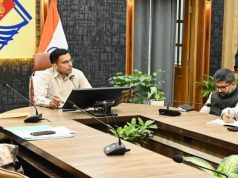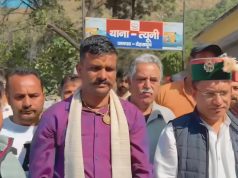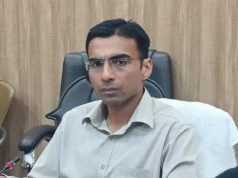By Tania Saili Bakshi / Nikita Aggarwal
DEHRADUN, 25 Oct: The ninth edition of the Valley of Words (VoW) Festival began here on Saturday. The venue, Hotel Madhuban with a day filled with literature, art, music, and conversation, reaffirming its legacy as India’s premier celebration of words, wisdom, and creative thought. Hosted across Main Stage, Words, and Shabdavali, alongside its lush lawns and corridors, Day 1 offered a seamless blend of reflection, performance, and intellectual engagement that celebrated the cultural soul of the Doon Valley.
The festival opened with a powerful inauguration commemorating Guru Tegh Bahadur, marking 350 years of his supreme sacrifice for the right to religious freedom. The ceremony, themed “Sees Diya, Sirar Na Diya”, set a deeply spiritual tone with Shabad recital by students of Gurudwara Paonta Sahib. A conversation featuring KBS Sidhu and Tarun Vijay, moderated by Anoop Nautiyal, explored the Guru’s legacy as a symbol of compassion and moral courage. Supported by Prasar Bharati, Him Jyoti School, and Guru Nanak School, and backed by the Gurudwara Shri Hemkunt Sahib Management Trust, the opening tribute reminded audiences of India’s enduring ideals of faith and unity. Simultaneously, the lawns came alive with Iti Smriti and Iti Lekh, VoW’s memorabilia corner and Natraj’s Green Bookstore, respectively, offering locally-sourced sustainable crafts, author books, and mementoes that echoed the festival’s ethos of creativity rooted in community.

The literary celebrations began with the VoW Book Awards (VBA) 2025. In English Fiction, Lakshmi Murdeshwar Puri’s Swallowing the Sun took centre stage.
Moderated by Manoj Barthwal, the session explored the novel’s poetic inspiration from Muktabai’s abhang and its narrative of a young woman’s awakening during
India’s freedom struggle. The discussion, supported by Doon University and Sri Guru Ram Rai University, drew admiration for its depth and lyrical storytelling. In parallel, Sudhir Vidyarthi’s Bidaai De Ma! was presented under the Hindi Non-Fiction category, moderated by Mamta Kiran. The session celebrated the silent heroism of mothers who nurtured India’s revolutionaries, blending history with emotion in a heartfelt tribute to forgotten patriots.

Inclusivity found its voice through the Indian Sign Language Workshop, put together by the faculty and students of Bajaj Institute of Learning. The session was well attended by students of Him Jyoti School, and Montessori School who eagerly picked up sign language and tried to communicate with their counterparts. Later in the morning, Iti Nritya, curated by Shalini Rao, mesmerised audiences with Dhanashree Joglekar’s Kathak and Lakshman Vinayak’s Bharatanatyam performances. Chaired by Principal DPS Vikasnagar Soneyaa Kumar and graced by
Guest of Honour Sharmila Bhartari, the dance performance celebrated the spiritual and narrative power of dance.
Words Hall hosted Kaho Kavita, a poetry session where Atul Sharma, Someshwar Pandeya, Mamta Kiran, Bharti Sharma, and Indu Aggarwal enchanted audiences with Hindi, Urdu, and Punjabi verses. Chaired by LS Bajpai and moderated by Anjum Sharma, the gathering highlighted linguistic diversity and poetic vibrancy.

Meanwhile, in Shabdavali Hall, Cabinet Notes to Haiku featured Mugdha Sinha, Pramod Jain, and Mukul Kumar in conversation with Ajay Jugran. The speakers, all civil servants, discussed how the rigour of bureaucracy coexists with the introspection of poetry, turning policy into art and reflection.
The afternoon witnessed an inspiring showcase of youth and innovation through Yuva Vani: My Vision of Uttarakhand @2047, moderated by Sachin Chauhan and chaired by Amna Mirza. Students from leading schools, including Brooklyn Hill, Cambrian Hall, Doon International, Him Jyoti, Jaswant Modern, RIMC, Tibetan Nehru Memorial, and Welham Girls, presented their vision of Uttarakhand@2047 in eight languages, namely Hindi, Garhwali, Kumaoni, Jaunsari, Punjabi, Nepali, Sanskrit, English and Tibetan. Their ideas on sustainability, equality, and heritage painted a hopeful picture of tomorrow’s Himalayan state.
In another session titled Ann: Farm to Table – The Culture & Business of Food, moderated by Roopa Soni (SoulFit), entrepreneurs Nupur Aggarwal (KIWI), Shruti Gupta (Coco; Monsoon), and Yojana Khanduri Chaudhary (Himalayan Rasoiya) discussed the evolution of Uttarakhand’s culinary scene. From organic farming to fine dining, they traced how local produce and tradition are reshaping modern gastronomy. Meanwhile, VBA Winner for Young Adult Literature author and artist Kripa’s session art is a voice, moderated by Ira Chauhan, emphasised how creative expression can be a tool of protest and collective awakening, inspiring youth to reimagine activism through art.
Environmental consciousness took centre stage in the RS Tolia Forum for Sustainability with the discussion The Glaciers Are Melting – Are We Listening? featuring Rajendra Dobhal, Harish Bahuguna, and Kusum Arunachalam, moderated by journalist Rahul Kotiyal. The panel explored the ecological crisis in the Himalayas and underscored the urgent need for awareness, science-driven policy, and grassroots participation. Complementing this was Nritya Ganapati- Form to Flow, a dance workshop by Curator of Iti Nritya Shalini Rao, which explored the layered iconography of Lord Ganesha as a symbol of creativity and divine energy, attended by students from Welham Girls’ School, Him Jyoti, and DPS Vikasnagar.
In the late afternoon, Main Stage hosted Military History & Strategy, featuring General VK Ahluwalia (A General’s Odyssey: Giving Up Is Not an Option) and General Shakti Gurung (Breaking the Glass Ceiling), moderated by Lt Gen PJS Pannu. The session celebrated perseverance, leadership, and inclusivity within the Indian Army. A heartfelt Tribute to Sudhir Arora followed, where Rama Bijapurkar, Col GC Srivastava, and Randhir Arora, moderated by Kulbhushan Kain, honoured the late editor and historian for his contribution to literature and military studies.
Parallel to this session was the Poetry Café in Words Hall, moderated by Aditi Bisht.
It showcased an intergenerational gathering of poets, Harjit Lally, Ajay Jugran, Deepanjali Singh, Shubhra Pandey, and Nikita Aggarwal, who read evocative verses celebrating identity, home, and emotions. This was followed by another engaging session of Military History & Strategy on the Main Stage, featuring General Ajai Kumar Singh (Beyond the Battlefield: Spirituality as an Enabler of Military Leadership) and General Balraj Mehta (Commanding Excellence: Leadership Secrets), again moderated by Lt Gen PJS Pannu. The conversation seamlessly linked leadership principles with mindfulness, exploring how spirituality empowers discipline and compassion in command.
Adding a touch of adventure, naturalist and traveller Nitin Gairola, in conversation with author Ratna Manucha, took audiences around the World through a captivating slideshow featuring forests, glaciers, tundras, and grasslands. His stories celebrated the beauty of the natural world while reminding listeners of their responsibility toward conservation and sustainable exploration.
Throughout the day, the festival’s corridors and lawns mirrored the diversity of sessions within. Sculptor Satpal Gandhi’s exhibition of busts and statuettes captivated art enthusiasts, while NAFED’s display of agricultural and horticultural products and Tribes of India’s showcase of handlooms and crafts offered a tactile experience of India’s indigenous wealth. Bhumesh Bharti’s photographs of mountains, hills and nature were displayed in prominent screens put up at the venue.
As the evening settled over the Doon Valley, the festival concluded its first day with the much-anticipated ITC-SRA Musical Soiree Evening. Featuring sitarist Srijanee Banerjee and tabla virtuoso Ashis Paul, the concert celebrated the classical traditions of Hindustani music. Chief Guest Beena Bhatt graced the event, with Amna Mirza as the emcee. Continuing the collaboration between ITC Sangeet Research Academy and VoW, the performance exemplified the guru-shishya parampara and transported the audience into a realm of meditative melody and
rhythm.
Day 1 of Valley of Words 2025 thus came to a close in an atmosphere of harmony and reflection. From the spiritual invocation of Guru Teg Bahadur’s sacrifice to the thought-provoking discussions on literature, ecology, and leadership, the day embodied the festival’s mission to unite art, ideas, and action. Each session, performance, and conversation reaffirmed that VoW is more than a literary festival; it is a living dialogue of cultures, generations, and creative voices. Under the setting sun, the melody of sitar and tabla carried the spirit of togetherness, promising another day of enlightenment and inspiration in the Valley of Words, Shabdavali.








